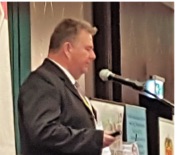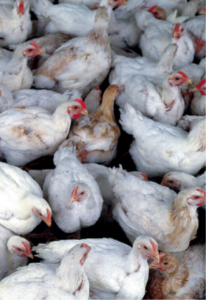The CEO of Mainland Holdings wants a national register of landowners willing to lease their land or grow crops on their property. David Alcock has also outlined his company’s plans to boost feedstock for poultry and pigs, to reduce costs and save foreign exchange.

Mainland Holdings’ David Alcock
One of the biggest costs in PNG is imported raw materials. After reviewing the company’s operations, Mainland Holdings has begun planting sorghum and soy to replace imported feedstock for pigs and poultry.
‘Cropping is our newest and most exciting development,’ CEO David Alcock told the inaugural agricultural conference in Port Moresby last month.
In 2018, Mainland Holdings plans to grow 7500 tons of sorghum in the Markham Valley in Morobe Province, using company land and that of two or three small out-growers, who will lease their land at K120 per hectare for an initial 12 months.
‘There is a need to create a land bank register of landowners.’
Mainland Holdings is the largest producer of stock feed in PNG, producing 100,000 tons of finished stockfeed per annum, he said, made up of cereal (wheat or sorghum) and protein (soy or canola) crops. These reduce the need for imported grains and thus foreign exchange.
Land bank
Alcock said there was a need to create a land bank register of landowners throughout the country who were willing to lease their land or grow crops on their property.
‘We’d like to identify suitable areas for cropping throughout all areas of PNG where landowner issues can currently make development problematic.’
‘The Grains Industry Association would collate information on the need for grains.’
He also called for tighter border security to protect poultry stock from disease and sharing of cropping data with the National Agricultural Research Institute. He suggested establishing a Grains Industry Association which would collate information on the need for grains, people who are growing it and where it can be grown.
Alcock also saw potential to export into Solomon Islands and other Pacific nations, as well as Asia, where bird flu and other diseases had taken their toll.
‘The company wants to involve landowners in leasing their land.’
‘The clean, pristine climate of PNG can’t be over-estimated,’ he said.
Leasing

Stock feed is used for poultry
In order to produce 100,000 tons of stockfeed in PNG each year, the company needs 63,000 tons of sorghum (approximate value K38 million) and 16,000 tons of soy (approximate value K21 million).
‘Our vision is to continue to be the leader in the PNG agribusiness sector, with extensive operations PNG-wide,’ said Alcock. ‘Our mission is to have net sales of K600 million in 2020.’
He added that in the three years to 2017, sales had gone up 36 per cent: from K257 million to K350 million.
The company wants to involve landowners in leasing their land to Mainland for between one and three years. In return, the company would develop their land at zero cost, offer farmer training techniques, and sell the sorghum or soy to Mainland at an agreed volume, value and price.
‘After the lease period, [they] can then choose to renew or farm the land themselves.
‘We believe it’s an opportunity to open the market to grains for large and small- to medium-sized businesses in PNG.’
Contracts
Alcock noted that the company has contracts with 260 poultry growers in Lae and Port Moresby.
‘These SMEs deliver 50 per cent of poultry that comes through our processing (system) each week and they earn K6.4 million per annum.’
There is ‘tremendous scope’ for large, medium and small growers to achieve similar volumes, he added.
During 2017, Mainland Holdings planted 60 hectares of sorghum and learned about rainfall patterns and pest control.
In February, 2018, it will plant a further 1500 hectares of sorghum, of which 800 hectares will be owned by ‘outgrowers’. Next November, it will plant another 1500 hectares of sorghum and a further 3000 hectares in February, 2019.








Speak Your Mind